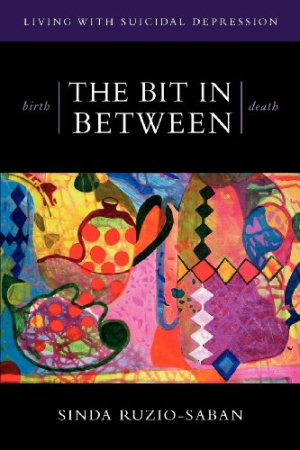birth | THE BIT IN BETWEEN | death
The Allure. The Taboo. Living with Suicidal Depression
Sinda Ruzio-Saban bares her soul in her new book, birth | THE BIT IN BETWEEN | death, the story of her journey through a life of depression and “almost constant suicidal thoughts and desires.” As a first-person account, it is heart-wrenchingly sad and even frightening, and there are many readers who simply will not want to hear about the author’s troubles. Those who have been in her position—or know someone else who has—are more likely to approach the topic openly and even take comfort from what Ruzio-Saban has to say. Simply knowing what this woman has faced may help others suffering similar difficulties. Either way, this is not an easy book to read.
Well aware that society in general is not particularly receptive to discussions about depression, Ruzio-Saban forges ahead anyway, with both purpose and conviction. Simply writing her book has clearly taken incredible courage. She discusses depression and the even less socially acceptable topic of suicide, freely sharing her thoughts, experiences, and self-discoveries. Believing that “a sufferer’s view from the inside looking out” is far different from a clinician’s perspective, she writes not only for those who already understand depression but also to reach those who do not.
Pages of poetry accompany the text, written as Ruzio-Saban muscles a path through her own suicidal depression and appearing almost like photographs illustrating her mind-set as she processes various issues. Although poems like “Slit Wrists Daydreaming” may not be to every reader’s taste, they convey the depth of the struggle this author continues to face every day. Her strongest message is that “people need to know more about this disease,” a sentiment that even those who have never faced serious depression may be convinced to support.
Ruzio-Saban undoubtedly has her own theories about why she is afflicted with the issues she discusses. She mentions her “deep family history of depression and suicide…on both sides of the family” and describes a lonely, confusing childhood with a missing father and a mother whose love was one of “duty, obligations, and stern looks” rather than “cuddles, laughs, [and] understanding.” Even so, she explains that family history is not the only—or even a necessary—contributing factor, reiterating that virtually anyone can suffer from depression.
Her message is more important than her style. A number of sentences are not complete, but she nonetheless makes her point. Absorbing her words is like listening to a friend who is trying to explain something difficult: wanting to understand, trying to understand, not always getting it, but listening closely all the same. For some, it will be familiar and reassuring; for others, revelatory, uncomfortable, or even distasteful. This is a book for a specific audience, and those who read it through to the end are certain to be affected by all that Ruzio-Saban has to say.
The subject matter of birth | THE BIT IN BETWEEN | death will preclude many readers from even picking it up, but for those who do, it offers a raw account of one woman’s experiences dealing with the often taboo subject of not merely depression, but suicidal depression.
Reviewed by
Cheryl Hibbard
Disclosure: This article is not an endorsement, but a review. The publisher of this book provided free copies of the book and paid a small fee to have their book reviewed by a professional reviewer. Foreword Reviews and Clarion Reviews make no guarantee that the publisher will receive a positive review. Foreword Magazine, Inc. is disclosing this in accordance with the Federal Trade Commission’s 16 CFR, Part 255.

